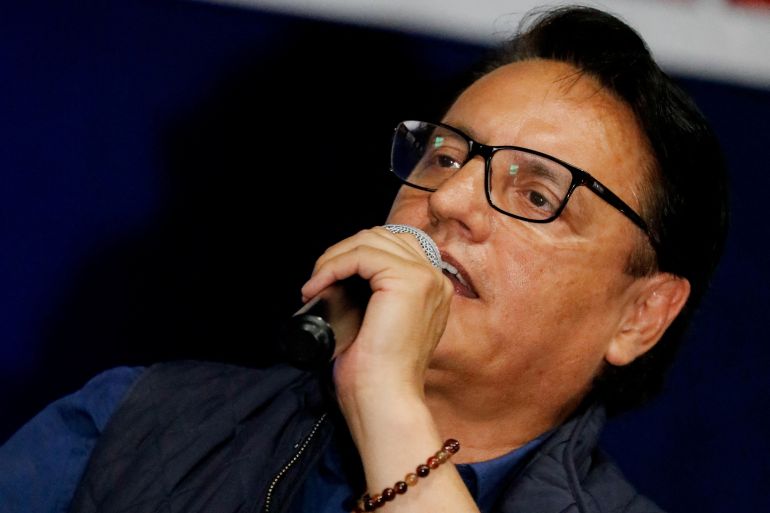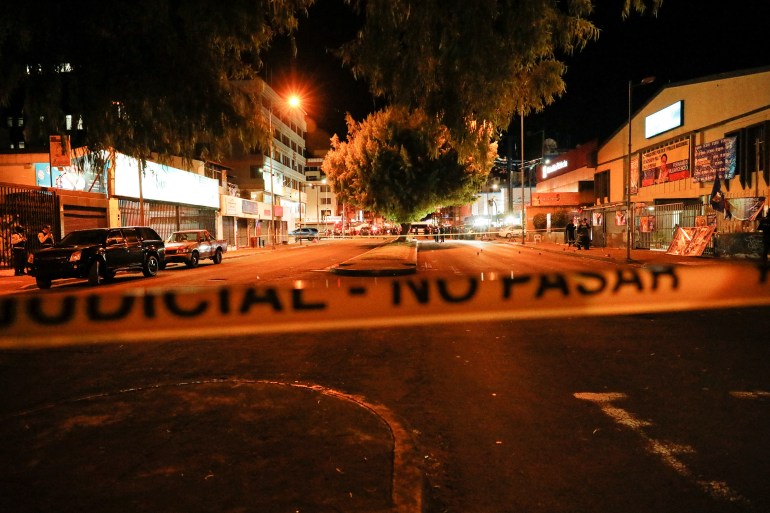Who was Fernando Villavicencio, presidential hopeful shot dead in Ecuador?
Killing of Villavicencio, former journalist and union member who pledged to fight corruption, comes days ahead of vote.

Ecuadorians are reeling after presidential candidate Fernando Villavicencio was shot dead following a campaign event, prompting authorities to declare a nationwide state of emergency.
Villavicencio, a 59-year-old anticorruption campaigner, had complained of receiving death threats before his assassination in the capital Quito on Wednesday evening, officials said.
Keep reading
list of 3 itemsEcuador beset by crime, economic woes ahead of presidential vote
Ecuador assesses toll of prison violence as 17 guards still held
On Thursday, the day after the shooting, Ecuadorean police confirmed that six suspects had been taken into custody, with a seventh killed during the shooting. All the suspects are Colombian, the police said.
Outgoing President Guillermo Lasso also declared three days of mourning and a two-month state of emergency but said general elections, scheduled for August 20, would be held as planned.
“Outraged and shocked by the assassination of presidential candidate Fernando Villavicencio,” the president, who is not seeking re-election, said in a statement posted on social media.
“This is a political crime, which has the character of terrorism, and we do not doubt that this murder is an attempt to sabotage the electoral process,” Lasso also said in a video statement after meeting security and electoral officials. On Thursday, he announced his government had reached out to the Federal Bureau of Investigation (FBI) in the United States for support in its investigation.
Here is what to know about Villavicencio:
Campaigner against corruption
Hailing from the Andean province of Chimborazo, Villavicencio was one of Ecuador’s most critical voices against corruption, especially during the presidency of Rafael Correa between 2007 and 2017.
He entered politics as an anticorruption campaigner after years of investigating the government as an independent journalist. He also served as president of the legislative oversight commission, where he continued to denounce corruption.
Villavicencio filed many judicial complaints against high-ranking members of the Correa government, including against the ex-president himself.
He was sentenced to 18 months in prison for defamation over his criticisms of Correa, and fled to Indigenous territory in Ecuador, later receiving asylum in neighbouring Peru.
“Ecuador has become a failed state,” Correa, who now lives in Belgium, said on X, formerly known as Twitter, after the assassination. “Hopefully those who try to sow more hate with this new tragedy will understand that will only continue to destroy us.”
Edison Romo, a former military intelligence colonel, said the anticorruption complaints made Villavicencio “a threat to international criminal organisations”.
More recently, Villavicencio had on Tuesday made a report to the attorney general’s office about an oil business, but no further details of his report were made public. He was a former union member at state oil company Petroecuador and had denounced alleged millions in oil contract losses.

Complained of threats
Patricio Zuquilanda, Villavicencio’s campaign adviser, said the candidate had received at least three death threats before the shooting, which he had reported to authorities, resulting in one detention.
Villavicencio himself had said he received multiple death threats, including from affiliates of Mexico’s Sinaloa Cartel, one of a slew of international organised crime groups that now operate in Ecuador. He said his campaign represented a threat to such groups.
“Here I am showing my face. I’m not scared of them,” Villavicencio said in a statement, naming detained crime boss Jose Adolfo Macias by his alias “Fito”.
Villavicencio’s Movimiento Construye political party also said on social media that armed men attacked its Quito offices in a separate incident.
The party said discussions had been held recently about whether to suspend campaigning due to political violence, including the July murder of the mayor of Manta.
Villavicencio opposed the suspension, the party said, saying “keeping silent and hiding in moments when criminals [assassinate] citizens and authorities is an act of cowardice”.
In his final speech before he was killed, Villavicencio promised a roaring crowd that he would root out corruption and lock up the country’s “thieves”.
Some 30 candidates in the upcoming Ecuadorian elections, including six of the eight presidential candidates, had been under police protection before Villavicencio’s assassination as a result of rising insecurity in the country.
In recent years, Ecuador has been hit by a wave of violence linked to drug trafficking. The homicide rate has doubled between 2021 and 2022.
“The Ecuadorian people are crying and Ecuador is mortally wounded,” said Zuquilanda. “Politics cannot lead to the death of any member of society.”
Presidential candidate, father of five
Villavicencio had pledged to combat corruption and reduce tax evasion if elected later this month.
But he was not the frontrunner in the presidential race: According to opinion polls, his support was at 7.5 percent, ranking him fifth out of the eight candidates.
As a legislator, Villavicencio was criticised by opposition politicians for obstructing an impeachment process this year against Lasso, which led the president to dissolve the legislature and call early elections.
Villavicencio is survived by his wife and five children.